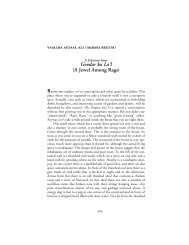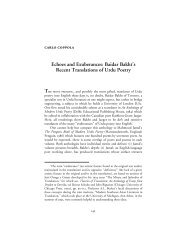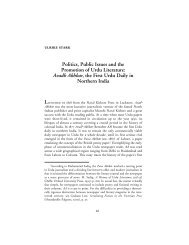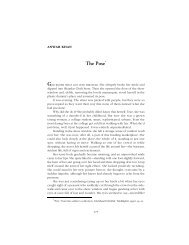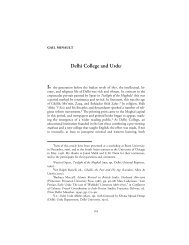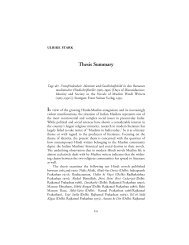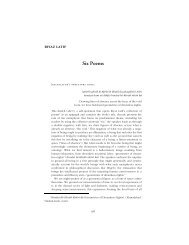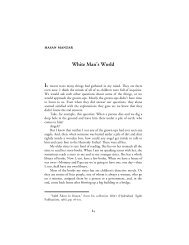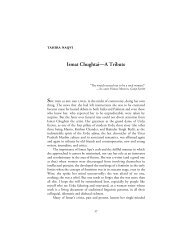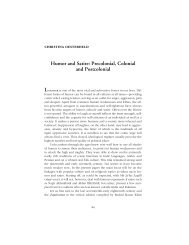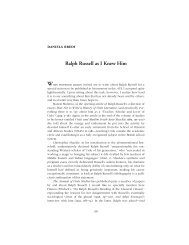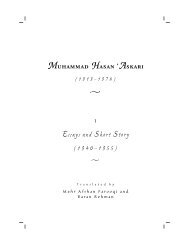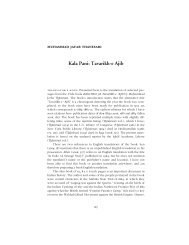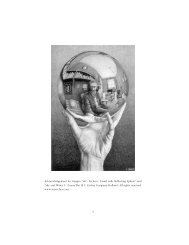Form or Mere Illusion?* - the Annual of Urdu Studies
Form or Mere Illusion?* - the Annual of Urdu Studies
Form or Mere Illusion?* - the Annual of Urdu Studies
- No tags were found...
Create successful ePaper yourself
Turn your PDF publications into a flip-book with our unique Google optimized e-Paper software.
8 • The <strong>Annual</strong> <strong>of</strong> <strong>Urdu</strong> <strong>Studies</strong>, No. 25Not just psychological, this can even turn into a biological problem.However, looking at it merely from <strong>the</strong> artistís vantage, we would call it amaj<strong>or</strong> artistic snag. The concept <strong>of</strong> ìart f<strong>or</strong> artís sakeî was introduced tosolve it. Here, too, I shall vehemently deny that ìart f<strong>or</strong> artís sakeî is anethically decadent concept. I have already shown above how even triflingm<strong>or</strong>al relationships have become impossible f<strong>or</strong> <strong>the</strong> artist. The conceptìart f<strong>or</strong> artís sakeî is not so much a disengagement from m<strong>or</strong>ality as it is<strong>the</strong> pursuit <strong>of</strong> a new kind <strong>of</strong> m<strong>or</strong>ality f<strong>or</strong> <strong>the</strong> artistóhowever imperfectand riddled with flaws this might be. Goodness and truth are discussableconcepts and can be laid out rationally with appreciable success. Thentoo, society plays a maj<strong>or</strong> role in f<strong>or</strong>mulating standards <strong>of</strong> goodness andtruth and no one is immune from contact with <strong>the</strong> material aspects <strong>of</strong><strong>the</strong>se standards in <strong>the</strong>ir everyday life. They are overwhelmingly collectivein nature and derive <strong>the</strong>ir legitimacy to a large extent from <strong>the</strong>ir commonacceptance. Argumentation, f<strong>or</strong>cing o<strong>the</strong>rs to accept oneís views <strong>or</strong> accepting<strong>the</strong>irsósuch things looked quite absurd and meaningless, perhapseven imm<strong>or</strong>al to <strong>the</strong> new artists. Their artistic problem compelled<strong>the</strong>m to take recourse in ìbeautyîó<strong>the</strong> third element <strong>of</strong> <strong>the</strong> ethical trinity.ìBeautyî tends to be a comparatively m<strong>or</strong>e individualistic concept, has todo m<strong>or</strong>e with sens<strong>or</strong>y experience than intellect. Hence one can proclaimits reality with greater au<strong>the</strong>nticity and certitude. It also does not leavemuch room f<strong>or</strong> discussion.The demise <strong>of</strong> all o<strong>the</strong>r ethical relationships drives <strong>the</strong> new artist tocling to ìbeautyî as his last res<strong>or</strong>t, but beauty too can have a commonlyaccepted standard, which, to <strong>the</strong> new artist, is reason enough to considerit false. Hence, he is loath to assist in establishing anything at all, unwillingto accept such responsibility. He does not believe in permanent values,<strong>or</strong> if anything, only in <strong>the</strong>ir relativity. Consequently, he does notvolunteer to <strong>of</strong>fer any enduring standard <strong>of</strong> beauty. Baudelaire loves <strong>the</strong>clouds that flit away. In o<strong>the</strong>r w<strong>or</strong>ds, <strong>the</strong> beauty <strong>the</strong> new artists subscribeto is indeterminate, it keeps changingónot some timeless concept butonly <strong>the</strong> product <strong>of</strong> a fleeting impression.The final touchstone <strong>of</strong> art thus becomes purely aes<strong>the</strong>tic. Although<strong>the</strong> new artist continually says that beauty and truth are one and <strong>the</strong> samething, in <strong>the</strong> end <strong>the</strong>se w<strong>or</strong>ds reveal yet ano<strong>the</strong>r turmoil.When <strong>the</strong> Greeks proclaimed beauty and truth and goodness a unity,<strong>the</strong>y stressed all three equally, not beauty alone. Just as truth could producebalance and harmony in f<strong>or</strong>mal relationships, likewise truth as aconcept, <strong>or</strong> <strong>the</strong> moment when truth is achieved, should also be beautiful.By contrast, <strong>the</strong> new artists have been too impatient to rid <strong>the</strong>mselves <strong>of</strong>truth and goodness and disengage beauty from <strong>the</strong> trinity. They have not



